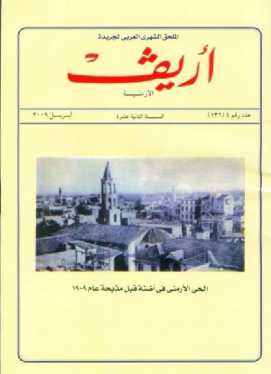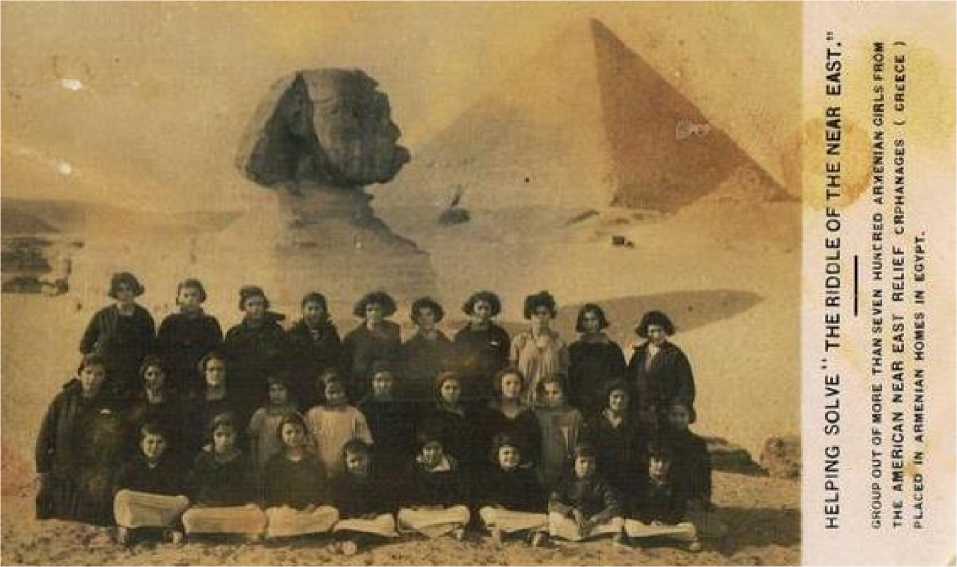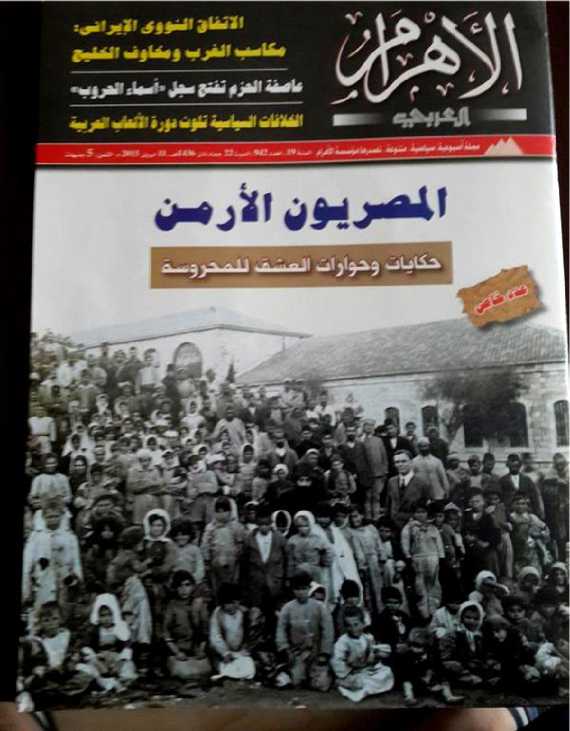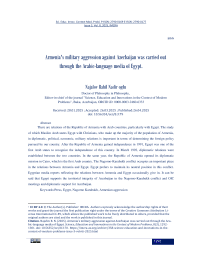Armenia's military aggression against Azerbaijan was carried out through the Arabic-language media of Egypt
Автор: Najafov R.N.
Журнал: Science, Education and Innovations in the Context of Modern Problems @imcra
Статья в выпуске: 3 vol.8, 2025 года.
Бесплатный доступ
There are relations of the Republic of Armenia with Arab countries, particularly with Egypt. The study of which Muslim Arab states Egypt with Christians, who make up the majority of the population of Armenia, in diplomatic, political, economic, military relations is important in terms of determining the foreign policy pursued by our country. After the Republic of Armenia gained independence in 1991, Egypt was one of the first Arab states to recognize the independence of this country. In March 1992, diplomatic relations were established between the two countries. In the same year, the Republic of Armenia opened its diplomatic mission in Cairo, which is the first Arab country. The Nagorno-Karabakh conflict occupies an important place in the relations between Armenia and Egypt. Egypt prefers to maintain its neutral position in this conflict. Egyptian media reports reflecting the relations between Armenia and Egypt occasionally give in. It can be said that Egypt supports the territorial integrity of Azerbaijan in the Nagorno-Karabakh conflict and OIC meetings and diplomatic support for Azerbaijan.
Press, Egypt, Nagorno Karabakh, Armenian aggression
Короткий адрес: https://sciup.org/16010554
IDR: 16010554 | DOI: 10.56334/sei/8.3.79
Текст научной статьи Armenia's military aggression against Azerbaijan was carried out through the Arabic-language media of Egypt
The current relations of the Republic of Armenia with Egypt, especially with Arab countries, are of interest to Azerbaijan, which has suffered from the military aggression of this country, due to a number of aspects. The study of diplomatic, political, economic and military relations of Armenia, the vast majority of whose population is Christians, with Egypt, the Muslim Arab state, is of importance in terms of determining the foreign policy course pursued by our country. After the Republic of Armenia gained independence in 1991, Egypt was one of the first Arab states to recognize the independence of this country. Diplomatic relations were established between the two countries in March 1992. In the same year, the Republic of Armenia opened its first diplomatic mission in the Arab countries in Cairo.
EgyptThe Nagorno-Karabakh conflict occupies an important place in relations between Armenia and Egypt. Egypt prefers to maintain its neutral position in this conflict. Although Egyptian mass media occasionally cover news reflecting relations between Egypt and Armenia, in general, it is clear that Egypt supports the territorial integrity of Azerbaijan in the issue of the settlement of the Nagorno-Karabakh conflict and has repeatedly provided diplomatic support to Azerbaijan at OIC meetings.
Main text
In the modern era, the media factor plays an important role in the foreign policy of the Republic of Armenia. The Republic of Armenia, which is economically weak and politically completely isolated in the region, is trying to use the numerous Armenian diaspora living abroad for its own purposes. The political and material assistance provided by Armenians living in different regions of the world to their historical homeland is perhaps one of the main factors ensuring that this state is not yet erased from the political scene. The numerous Armenian diaspora living in Arab countries is also considered one of the important links in the relations between Arab countries and Armenia. Armenians, who usually live compactly and prefer to organize, actively participate in certain processes in the political life of the country they live in, including in the press, and try to extract concessions for themselves [4, 21].
When talking about Armenians living in Arab countries, it is necessary to draw attention to two points. First, Armenians, as they were scattered in many regions of the world, have lived in Arab countries since ancient times. Second, after the well-known events that took place in the Ottoman Empire in 1915, a large number of Armenian families settled in Arab countries. Thus, large Armenian residential centers emerged in the Arab countries of the Middle East, and Armenian neighborhoods, churches, and schools were established in large cities [32].
Egypt has a special place among the Arab countries where Armenians settled. In the period after the Arab Caliphate, Armenians did not play a significant role in the socio-political life of Egypt. However, in the 19th century, the Egyptian ruler Muhammad Ali invited hundreds of Armenian families living in the Ottoman Empire to his country. After his invitation, the Armenian diaspora gained great opportunities in Egypt. They were engaged in usury and controlled tax issues. A significant part of tobacco production in Egypt passed into
the hands of Armenians. In different years, a large number of Armenian officials headed the ministries of foreign affairs, justice, and trade of Egypt. In the 40s of the last century, the number of Armenians in Egypt

was 40 thousand, but after various migration processes, this number is currently around 6 thousand [5].
In 1915In 1997, the Armenian lobby, founded by Dashnaktsutyun, began publishing a daily newspaper in Egypt called Housaper. The newspaper was published in Cairo at various intervals and was considered the official organ of Dashnaktsutyun. The Arev magazine, which is considered the historical legacy of this newspaper, has been published in Egypt in Armenian since 1997 and its pages give extensive space to falsified facts such as the fact that Nagorno-Karabakh is historically Armenian territory (See: Figure 1.) [4; 8; 11].
In Egypt Armenians living in the Middle East live mainly within
Muslim communities. These communities are tolerant of Christian Armenians and do not prevent them from freely preserving their ethnic and religious roots. Also, the mental closeness of Armenians and other peoples of the Middle East, the similarity of the functions of the family institution and other social institutions, create conditions for their life in these countries, and also allow them to preserve their religious and ethnic characteristics. The organization of Armenians also plays an important role here. Armenians, who first of all founded churches and schools in any country they moved to, thereby take the first steps towards the creation

and functioning of their diaspora, laying the foundation for diaspora activity. It is no coincidence that schools have always been of great importance in the organization of Armenians. From Istanbul to Cairo, it is possible to find Armenian schools in any point of the Middle East. Diaspora funds do not hesitate to spend large sums of money to establish these schools, because educational institutions play an exceptional role in preserving the Armenian national identity in foreign countries [25, 67 - 69pp.].
Thanks to the activities of the Armenian diaspora, a generation of Armenian-speaking writers, poets, and journalists has grown up in Egypt. Starting from the 1960s, the first Armenian-language newspapers and magazines began to be published in Syria and Egypt. Currently, the number of such periodicals exceeds 150 in Syria and Egypt, and more than 200 in Lebanon [6; 11]. In general, until the 1970s, the Arab countries of the Middle East played the role of a cultural center for Armenians, but against the background of the well-known events taking place in the region, they gradually began to leave these countries and head for the USA and Europe. It is believed that in modern times the Armenian population of Arab countries has decreased by up to 50 percent, especially after the events called the “Arab Spring”, the turmoil and wars that prevailed in the region forced Armenians to seek refuge in other regions of the world. However, despite all this, Armenians living in Arab countries, especially in countries such as Egypt, Syria, Lebanon, and Iraq, influence the socio-political and cultural life of these countries, and use their opportunities to establish and develop relations between the Armenian state and Arab countries. In some Arab countries, the election of Armenian deputies to parliament and the creation of their own cultural organizations ultimately have an impact on the foreign policy of these countries. Below, we will touch upon this issue again using the example of individual Arab countries.
Although the number of Armenians living in the Arab countries is not large in itself, their representation in important structures, economic and political institutions of those countries can be listed among the factors influencing the effective establishment of the activities of the Armenian diaspora. However, the total number of Armenians in these countries has significantly decreased compared to previous periods. Currently, there are 120 thousand Armenians living in Lebanon, 110 thousand in Syria, 20 thousand in Iraq, 10 thousand in Egypt, 10 thousand in Saudi Arabia, 6 thousand in Kuwait, 6 thousand in the UAE, and up to 4.5 thousand in Jordan. The number of Armenians living in Morocco, Yemen, Libya, Algeria, Tunisia and other Arab countries is not so large[27, 10 p.].
In the modern eraThe relations between Armenia and Arab countries.
After gaining its independence, the Republic of Armenia began to establish relations with various countries of the world. These relations, which began with diplomatic relations, later turned into commercial, economic, and political relations. Arab countries constitute one of the priority directions in the foreign policy of the Republic of Armenia. The fact that Armenians and Arabs lived in the same states within the Arab Caliphate and the Ottoman Empire, the existence of Armenian neighborhoods, religious, and ethnic communities in many large cities of the Middle East provided the basis for establishing these relations. True, it would be incorrect to claim that Armenia has relations with all Arab states of the same status, for example, if relations between Lebanon and Armenia are very close, then diplomatic relations between Saudi Arabia and Armenia do not exist. Therefore, when talking about Armenia's relations with Arab countries, we should take into account these specific points, the change in existing relations from country to country, and certain historical, geographical, ethnic, and economic factors affecting these relations [14].
The Republic of Armenia has established diplomatic relations with practically all Arab countries. Among these countries, it is possible to mention Syria, Lebanon, Egypt, Algeria, Oman, Morocco, Kuwait, Yemen, Jordan, the UAE, Iraq and Libya. Armenia currently does not have diplomatic relations only with Tunisia and Saudi Arabia. Embassies of Egypt, Syria and Lebanon operate in Yerevan, and in these countries, Armenian embassies have also been opened. There are also Armenian embassies in Arab countries such as the UAE and Iraq.
Armenian-Egypt relations.
ErmWe have touched upon the history of relations between Armenia and Egypt above. As is known, Armenians, who were invited to Egypt by the Egyptian ruler Muhammad Ali in the 19th century, played an important role in the political and social life of this country, and important sectors of the country's economy were placed under their control. After the Republic of Armenia gained independence in 1991, Egypt was one of the first Arab states to recognize the independence of this country. Diplomatic relations were established between the two countries in March 1992. In the same year, the Republic of Armenia opened its first diplomatic mission in the Arab countries in Cairo [8; 19].
EgyptThe Nagorno-Karabakh conflict occupies an important place in relations between Armenia and Turkey. Egypt prefers to maintain its neutral position in this conflict. As another indicator of Egypt's warm attitude towards Armenians, it is possible to cite the example of its approach to the ideas of the so-called Armenian genocide. In July 2013, Egyptian President Mohammed Morsi was removed from power and the military took over the country. After that, relations between Turkey and Egypt became tense, and in response to the accusations of the Turkish side, allegations of the Armenian genocide began to be heard more often in Egyptian politics. After Turkey and Egypt recalled their ambassadors, tensions increased even more, and even Egypt's interim president Adly Mansour announced that Egypt would sign an international document recognizing the Armenian Genocide. Messages supporting this claim increased in Egyptian public opinion, and the efforts of the Armenian diaspora operating in Egypt cannot be ruled out. Along with calls to recognize the Armenian genocide in newspapers and on television, proposals were also made to erect a monument in Cairo to immortalize the Armenian genocide [6].
Egypt and Armenia have also been cooperating in other areas over the past 20 years. This cooperation primarily includes political, economic, cultural, educational and scientific fields. Over the past 20 years, more than 40 interstate documents have been signed, numerous mutual visits of high-level officials have taken place, and many cultural and public events have been held.
The cultural factor is prominent in Armenia's cooperation with Egypt. The cooperation in the fields of opera, theater, ballet, and cinematography is accompanied by mutual visits by representatives of the arts of both countries. The holding of the Days of Culture of Egypt in Armenia and Armenia in Egypt, and the active participation of both sides in various scientific symposia can be considered as noteworthy moments.
But last yearIn recent years, relations between Armenia and Egypt have not been as active as they used to be. It is now clear that these relations are mainly at the level of consultations between various departments and ministries. For example, in recent times, mutual visits have been made by the Ministers of Health and Transport of both countries. Mutual visits of the Control Services of both countries can also be noted. Nevertheless, the economic and political crises faced by the Republic of Armenia have reduced its weight on the international scale, as well as led to a decline in its authority and interest in it among Arab states [10].
Economic cooperation between Armenia and the United States continues. However, the scale of this cooperation is very small. Armenia's main exports are paper and aluminum, while its imports are medicines, soap, and grain.
Coverage of Armenia's military aggression against Azerbaijan in Egyptian media
The official website of the Republic of Armenia in Egypt states that the effectiveness of the peace process in the Nagorno-Karabakh conflict needs to be improved [10]. To this end, the Armenian side speaks of the importance of ensuring the participation of the so-called Nagorno-Karabakh Republic in this process. Armenia believes that the right of Armenians, who were forced to settle in Nagorno-Karabakh, which has been completely ethnically cleansed of Azerbaijanis, to self-determination must be taken into account in bilateral negotiations. International guarantees should be given to the Armenian community to live in these lands under the jurisdiction of the Republic of Armenia. The occupying state Armenia points to Azerbaijan as the cause of the current conflict between the two countries and its attempts at a ceasefire that hinder the progress of the negotiations. The official website of the embassy clearly states in Arabic that Nagorno-Karabakh belongs to the Armenian community living there and that Azerbaijan has no legal, political or moral grounds to demand land from it. This is proof that the notorious neighbor Armenia, which has openly demonstrated its aggressive stance in Egypt, is not in favor of the return of the historical Azerbaijani lands it has usurped through negotiations.
Figure 3. Special Armenian edition of Al-Ahram in Egypt.

in agreement with its regional ally Russia [12].
The famous newspaper Al-Misru al-Mustaqillah draws attention to the implementation of energy projects in the region, the growing influence of Azerbaijan, and the gradual decline of Armenia's economic, political, and military potential, noting that the interest of the great powers in the region is undeniable. The author of the article "Return to war in a strategic space where oil and gas projects intersect," Mahmoud Sinavi, associates the main reason for the failure to resolve the conflict with the interests of Russia and Turkey in the region. In his opinion, the EU and the US do not have a say in the region. However, if Azerbaijan wants its historical lands back, then it should take a suitable position between Russia and Turkey. M. Sinavi believes that Iran's position in the region is more different and it acts more
"Al-Jumhuriyy"In its May 2016 issue, on page 4, the newspaper "Al-Jumhūriyah" (The Republic of Armenia) refers to the worsening of relations in Nagorno-Karabakh, and notes that the economic and political crises faced by the Republic of Armenia have reduced its international weight, as well as led to a decline in its authority and interest in it among Arab states. Another example of the ambiguity of Egypt's attitude towards Armenians, according to the Egyptian media, is its approach to the so-called Armenian genocide allegations. In July 2013, Egyptian President Mohammed Morsi was removed from power and the military took over the country. After that, relations between Turkey and Egypt became tense, and in response to the accusations of the Turkish side, allegations of the Armenian genocide began to be heard more often in the Egyptian press. After Turkey and Egypt recalled their ambassadors, tensions increased even more, and even former Egyptian President Adly Mansour announced that Egypt would sign an international document recognizing the Armenian Genocide. The Egyptian media, especially "Al-Ahram" (ألأھرام) (Tahir Mustafa, 2014, April issue),
also increased messages supporting this claim. Here, the efforts of the Armenian diaspora operating in Egypt cannot be ruled out. In addition to calls for recognizing the Armenian genocide in newspapers and on television, proposals were put forward to erect a monument in Cairo to immortalize the Armenian genocide.
"Al-Qahir""أل قاھرة) "ع) in its April 2016 issue noted that relations between Armenia and Egypt have not been as active as before in recent years. The report notes: "It is now clear that these relations are mainly at the level of consultations between various departments and ministries." Recently, mutual visits have been made by the ministers of health and transport of both countries. Mutual visits by the security services of both countries can also be noted.
The mass of EgyptAlthough the attitude of the foreign media to the April fighting is generally characterized as neutral, in fact, it is clear from the conversations of the residents that the Armenian military was the one who started the fighting. In her article on the news portal [20], Egyptian correspondent Sada Sardar (July 6, 2016) talks about meeting with residents of both sides and sharing their views. Olga Kruglova, a 67-year-old Russian by origin (a resident of the Tartar district), notes that when she arrived in Tartar, there was a 17-year-old. She lives with her daughter, but they are extremely stressed and afraid. They are afraid that the Armenian military will rekindle the war at any moment. Gulara Aliyeva, a 42-year-old internally displaced person who settled in Baku, Yeni Yasamal, notes that she lives in one room with her three children. However, she really wants to return to her native Karabakh. Gulara Aliyeva said that no place can be like one's native home. Egyptian correspondent Sada Sardar notes that the population living in Nagorno-Karabakh has temporarily settled in various parts of Azerbaijan, mainly in Baku. She concludes: "I have not seen a single person from Karabakh who does not wish to return to his native home."
Al-Ahram newspapernotes that Russia and Iran are in favor of peace in the region and the absence of a new war. They want a ceasefire to be achieved as soon as possible and for both sides to sit around the peace table. According to Al-Ahram, Nagorno-Karabakh is one of the conflicts that exist in the world. Both sides are allegedly interested in prolonging the conflict. Although Karabakh is considered a land belonging to Azerbaijanis, it is currently in the hands of ethnic Armenians. Both sides consider this territory to be their historical lands and are trying to acquire it [7].
Cairo news notes that the Nagorno-Karabakh conflict is completely under Russian control. "Nagorno-Karabakh is not a local conflict at all. It is one of the major ethnic conflicts in the South Caucasus and the world. Although a ceasefire has been achieved over time, in fact, there has been a war in the region for many years, and hundreds of people have been killed on both sides in these wars. Another formidable power in the region is Iran, which wants to have a nuclear warhead. There have also been certain tensions between Iran and Azerbaijan, and Iran's future activities in the region will not represent Azerbaijan's interests at all"[13].
Conclusion

The history of relations between Armenia and Arab countries dates back to ancient times. As is known, Armenian communities were settled in Near Asia and Egypt even before our era. Later, various cultural and trade relations were established between Armenians and Arabs living within the Arab Caliphate and the Ottoman Empire, and the religious factor was especially important in the relations between the Christian Arabs of Syria and Lebanon and Armenians.
In modern times, the main role in establishing relations between Armenia and Arab countries is played by the Armenian diaspora living in these countries. Armenians, who usually attract attention with their compact living and organization, despite their small numbers, establish television, radio, newspapers and magazines in various Arab countries, and carry out the activities of universities and schools. The large number of Armenians among civil servants, representatives of the industrial and banking sectors increases the influence of the Armenian diaspora in some Arab countries.
Among the Arab states with which Armenia currently has closer relations, we can mention Egypt, Syria, Lebanon, and Iraq. The Gulf countries are also among the Arab states of interest to Armenians. However, thanks to the successful activities of Azerbaijani diplomacy, more and more Arab states are condemning Armenia's occupation policy, while influential states such as Saudi Arabia do not cooperate with the occupier.
Another form of Armenian-Arab relations is the work being done towards the official recognition of the so-called Armenian genocide by Arab countries. However, with the exception of Lebanon, other Arab countries prefer to approach this issue with caution.


